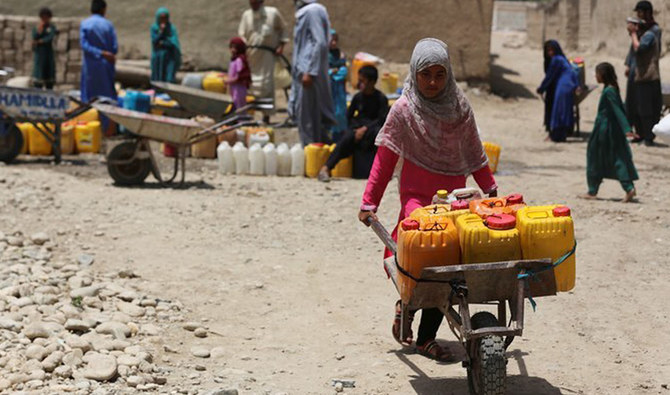LONDON: Thousands of women in Arab and Muslim countries will risk dying during childbirth and from preventable conditions due to recent UK aid cuts, NGO officials have told Arab News.
A similar verdict was issued as part of an internal review into cuts to the UK’s Overseas Development Assistance budget for 2023-2024, warning ministers of the consequences of budget slashing.
The assessment, published by the International Development Committee, warned that a reduction in aid to Afghanistan would mean that the Foreign, Commonwealth and Development Office “will not be able to support critical services for women and girls.”
It added: “Since returning to power, the Taliban has imposed restrictions on women and girls; preventing them from enjoying their human rights and systematically erasing them from public spaces.
“Therefore, reducing funding will potentially leave some of the most vulnerable women and girls in the world without critical services.”
A further 500,000 women and children in Yemen will also lack access to critical health care as a result of the cuts, the assessment warned.
Oxfam’s head of policy and advocacy, Katy Chakrabortty, told Arab News: “The FCDO’s impact assessment form makes for difficult reading. It was clear that any reduction in UK aid over recent years would have an impact on the most vulnerable, but this assessment paints a devastating picture.”
She described the aid cut to Yemen as “a terrible blow for a country that has been affected by eight years of conflict.”
Sudan and Somalia will also face significant budgetary constraints, with the internal review warning that a program to end female genital mutilation in the latter may be shut down as a result of the aid losses.
Campaigns against famine will also be affected across East Africa, Chakrabortty said, adding: “UK aid cuts have left millions of people in East Africa vulnerable to famine, with one person dying across Ethiopia, Kenya, Somalia and South Sudan every 28 seconds as result of severe hunger.
“The UK must step up its support for communities and countries now, before millions more people are forced to face the consequences.”
The budget cuts follow the UK government’s 2020 commitment to reduce overseas development aid from 0.7 percent to 0.5 percent as a proportion of gross national income.
Though the latest two-year budget signals a marginal increase in funding and commits to a 12 percent rise for 2024-2025, aid figures are still proportionally lower than pre-2020 levels.
Programs to combat violence against women and girls in Somalia and South Sudan will also lack “adequate attention and response” as a result of the cuts, the internal assessment warned.
Foreign Office Minister Andrew Mitchell said the report had served as a “key component of allocation decision-making.”
He added that the FCDO had made adjustments to the budget to account for the review’s considerations, ensuring that “support reached the most vulnerable.”
Save the Children UK CEO Gwen Hines told Arab News: “The UK’s aid cuts are a death sentence for children already living in some of the most dangerous parts of the world, today’s impact assessment confirms.
“It’s reprehensible that ministers decided to reduce the aid budget — and hollow it out by spending vast amounts of Official Development Assistance in the UK — even though they knew it would cost children’s lives.
“These cuts fly in the face of the government’s commitments to ‘leave no one behind.’ We urge them to restore the UK’s aid budget to 0.7 percent of GNI.”
The publication of the internal assessment is a rare breach of precedent for the FCDO, with reviews carried out by previous governments having been kept private.
The reallocation of one-quarter of the aid budget to the UK Home Office for spending on refugee housing has also played a role in the budgetary changes.
Across Africa, the number of unsafe abortions is set to rise three-fold due to the cuts, with the number of maternal deaths prevented dropping “from 2,531 to just over 1,000,” the review said, adding that Yemen’s health sector may suffer “lasting damage if other donors are unable to fund” it.
An FCDO spokesperson said: “UK aid spending is due to increase to £8.3 billion ($10.5 billion) next year, and will be focused on programs addressing humanitarian crises, protecting women and girls and supporting the world’s most vulnerable, while delivering value for money for taxpayers.
“While the budget for low-income countries has had to be reduced in the short term to achieve our savings target, it is due to nearly double for these countries the year after, including in Africa, where aid will rise from £646 million to £1.36 billion.”












